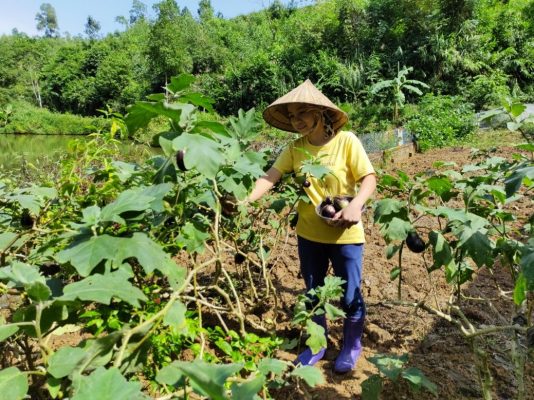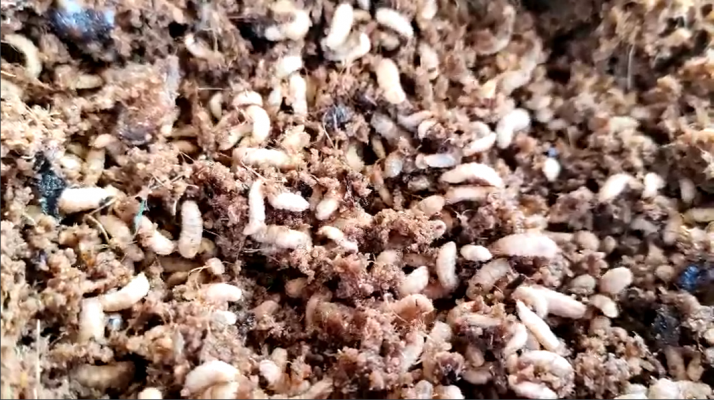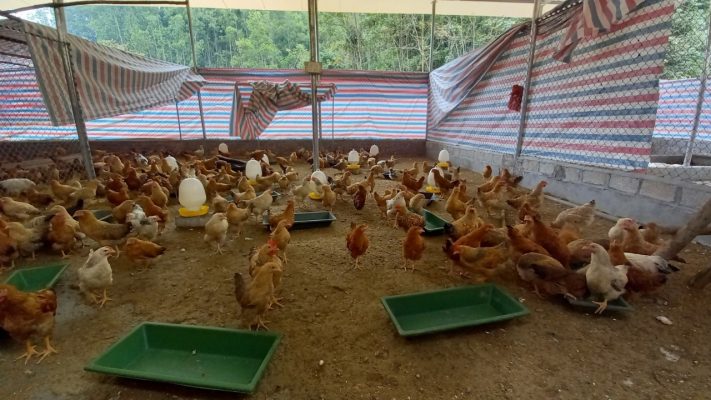The story of natural agricultural production of Ban Luong Cooperative – Bac Kan province
When thinking about solid waste, most of us will immediately think of a”mountain” of waste in landfills on the outskirts of big cities. However, nowadays, along with the increasingly diversified structure of rural production industries, agricultural activities have created a huge amount of solid waste, which will cause severe environmental pollution if remain untreated. On the other hand, it will become an economic and environmentally beneficial resource if treated effectively. Within the framework of the Eco-fair project, we met such a woman who is so passionate about environmental protection and sustainable agricultural production.
Used to work as an assistant to the board of directors of a corporation in the consultation and customer care sector in Hanoi, Ngo Thi Thanh Tam and her husband were determined to give up everything to move Bac Kan – a mountainous Northeast province to pursue their passion for clean agriculture. In the early days, they faced a lot of challenges, because it was such a huge difficulty to learn and explore everything related to agriculture, not to mention clean and sustainable agriculture. So often she doubted her choice of giving up a favorable life for such a challenging path.

Photo: Tam with a lush vegetable garden and a fish pond that she raises and takes care
As the Director of Ban Luong Cooperative, a highland agricultural cooperative in the Southeast of Bach Thong district, the center of Bac Kan province, Tam shared that she prefers to call what she is working on as natural farming rather than organic agriculture, because nowadays, the term “organic agriculture” is widely used by many people to promote their products, yet only few people fully understand the concept of organic agriculture. The core objective that she pursues is to make the most of indigenous varieties, local biodiversity, utilize waste from one process as raw materials for another process, try to create an end-to-end material cycle, wasting the least amount of waste in the production process.
The indigenous varieties of edible canna in Bac Kan are the beginning of her natural agricultural production chain. Edible canna and products processed from edible canna have become an outstanding feature in agricultural products of Bac Kan. However, the edible canna residue after filtering for starch is often discarded, which has created adverse effects on the soil and water environment around residential areas, at the same time wasting a highly potential resource. Many edible canna processing establishments often incubate edible canna pulp with urea and salt to make manure, however, this method has not really created natural products as expected.

Photo: Black soldier fly larvae are eating edible canna pulp under her experiment
When meeting the staff of the Eco-fair Project, Tam seemed to find friends with the same passion. Initially, they discussed and worked with her to find a solution to use edible canna residue as food for black soldier fly (BSF) – an insect with high nutritional value, used as animal feed without causing harm to the environment but easy to raise. This will help solve the problem of environmental pollution from edible canna residue, limit unpleasant odors for the surrounding residential area, and at the same time create a clean source of protein-rich food for chickens on her farm. In addition, black soldier fly excrement is a rich source of nutrient-rich fertilizer for plants, which, in turn, is used for growing edible canna. Up to now, she has successfully experimented with raising black soldier fly larvae on edible canna pulp.
She revealed with our project team about the desire to build a pilot farm in the region to demonstrate efficiency and find buyers, then transfer technology to local people to work together in the direction of “Natural Agriculture” of Ban Luong Cooperative.

Photo: The chickens are raised entirely with circulating materials, reused from the by-products of previous processes
Inspired by her determination, we have become more and more familiar with various online discussions and meetings during the Covid-19 pandemic. The Eco-fair project team continued to work with her to research, consult and build an end-to-end agricultural production facility, which is a place to receive and pilot new technologies and agricultural techniques transferred from CCS, the most typical of which is the application of biochar as a biological buffer in livestock farming, soil improvement and composting for organic farming, application of volumetric continuous biomass gasification (VCBG) technology (invented by CCS center) for biochar production and poultry heating.
On the way to building and developing her upcoming “natural agriculture” farm, she will certainly face many difficulties, but we believe that with her bravery and determination, all difficulties can only be overcome. She will be successful in building a true organic farm, which will become a model for those who choose the same path and passion, and at the same time spread the green and clean lifestyle to the community.
The article was written by the Center for Creativity and Sustainability and Consultancy (CCS), edited by the Eco-Fair Project.







